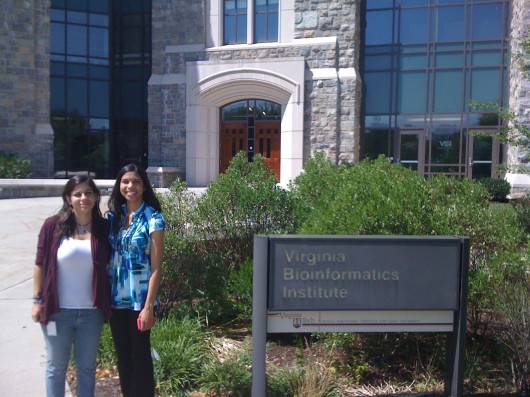NSU Newsroom
SharkBytes
Horizons
This version of NSU News has been archived as of February 28, 2019. To search through archived articles, visit nova.edu/search. To access the new version of NSU News, visit news.nova.edu.
This version of SharkBytes has been archived as of February 28, 2019. To search through archived articles, visit nova.edu/search. To access the new version of SharkBytes, visit sharkbytes.nova.edu.
Two Students Attend Bioinformatics Workshop, Begin Research on Genome Sequencing
Jhanelle Dawes and Ana Paula Delgado, biology majors in the Farquhar College of Arts and Sciences, began research this fall on genomics and bioinformatics. Their objective: to initiate comparative analysis between plant and animal pathogens, generating sequence information from Lagenidium giganteum, a pathogen to mosquitoes that can potentially serve as bioinsecticide.
In other words, the students are researching new ways to scientifically “swat” mosquitoes.
Their first step was to attend the Oomycete Bioinformatics Training Workshop held at the Virginia Bioinformatics Institute, June 28–July 1. Dawes and Delgado learned from presentations and hands-on training that focused on techniques associated with genome sequencing using oomycete, a fungus-like microbe, as a research model. Each student received a travel fellowship from Virginia Tech to attend the workshop, along with their faculty adviser, Aurelien Tartar, Ph.D., assistant professor in the college.
In addition to the funds for the workshop, Tartar received a grant from the U.S. Department of Agriculture (USDA) to conduct the research with his students. The USDA-funded project is part of a multimillion-dollar collaborative effort with several universities nationwide, dubbed the Undergraduate Genome Annotation Project.
Tartar also received two Chancellor’s Faculty Research and Development Grants from NSU in April 2010 and 2011 for related research. The grants have allowed him and his students to expand their project and further explore alternative pesticides using pathogens.
